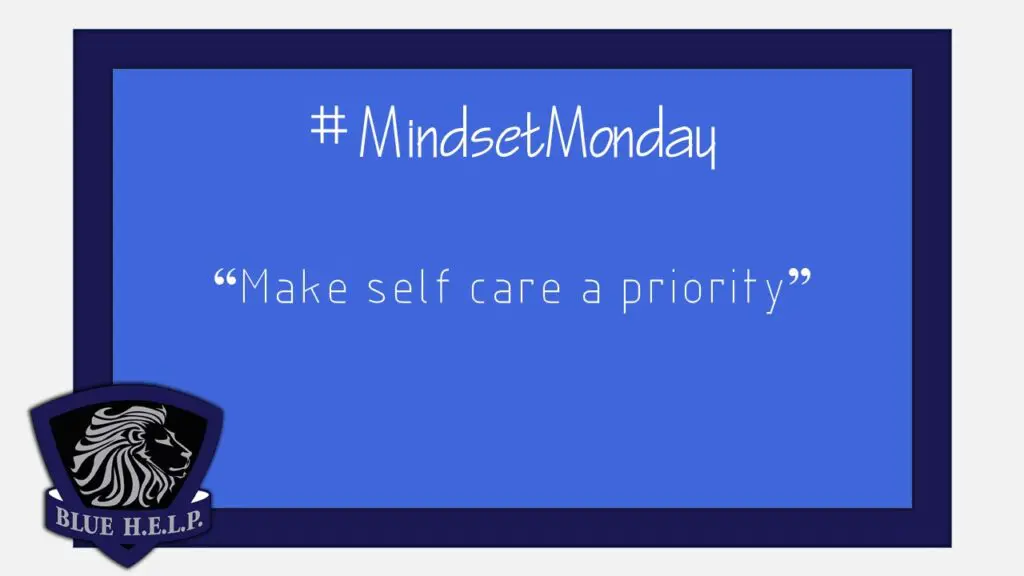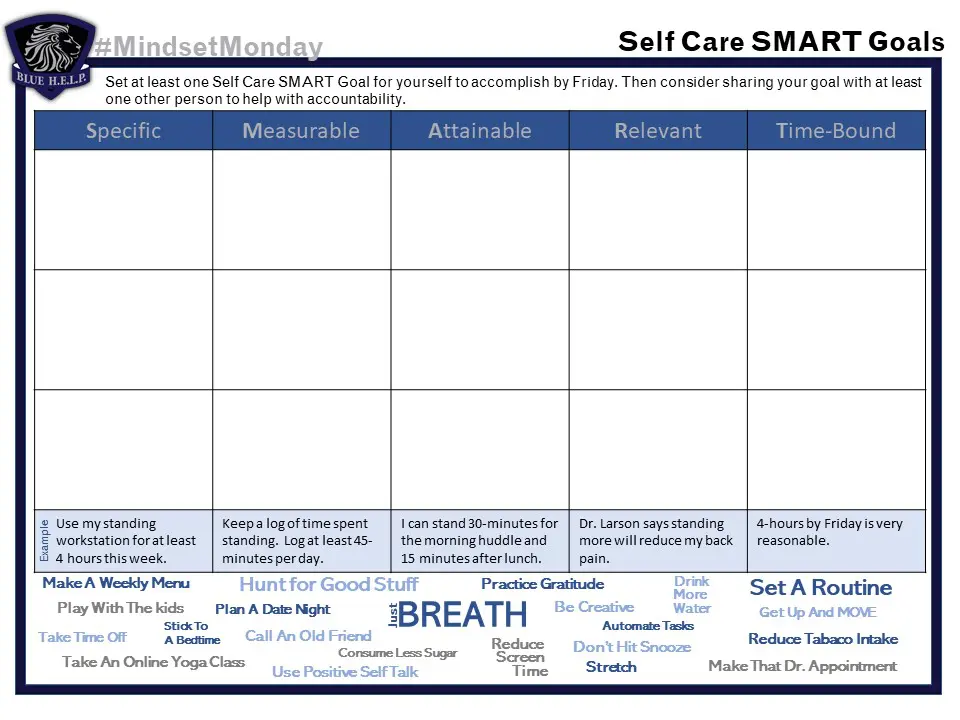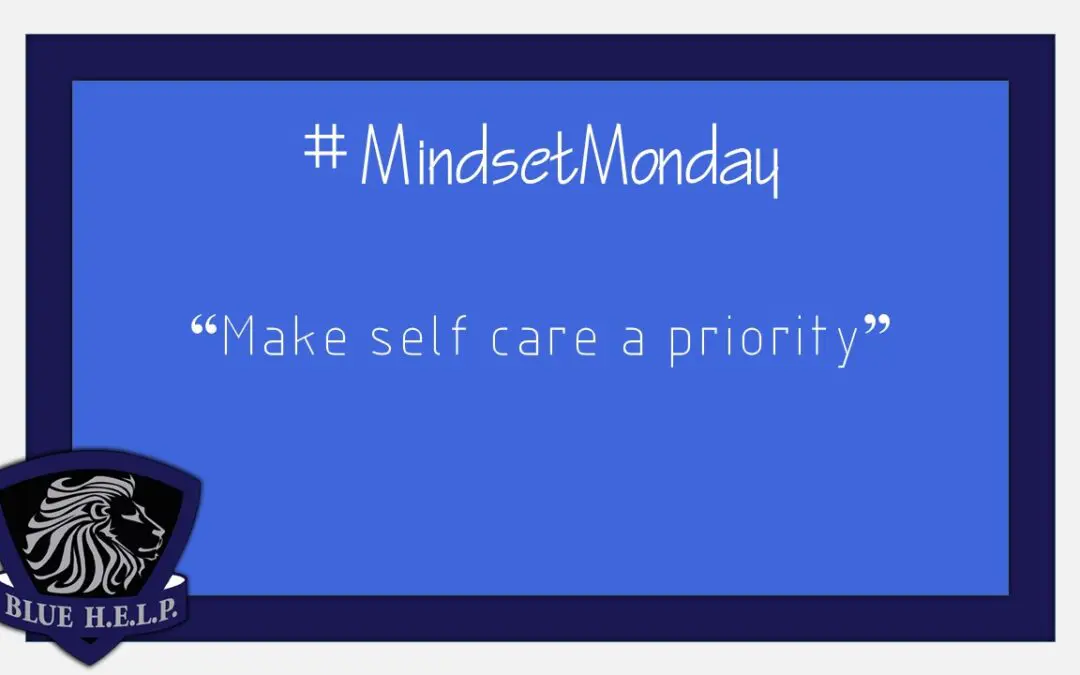In this week’s #Mindset Monday we’re encouraging readers to set SMART goals to make Self Care a priority. A recent Law Enforcement Bulletin from the FBI Website lists self care as the first recommendation to combat “Compassion Fatigue.”

Self Care Saves Lives
It’s not only compassion fatigue that chips away at wellness for police officers and their families though. Many readers can relate to lack of sleep, catastrophizing, financial concerns, inconsistent diet, lack of exercise, workload, and a whole list of other stressors. A wide array of things conflict with our best efforts to stay well. If this rings a bell with you, you’re not alone – the majority of American’s struggle with stress.
During times of heightened stress and anxiety people may find themselves stuck in a fixed mindset when it comes to self care and personal readiness. Perhaps telling themselves that they’re too busy for it. Maybe they’ve even said it is something they’re just not good at. Possibly they’ve just been putting the needs of others so far above their own that they never get to their own needs. This post encourages the reader to take on a growth mindset and realize that they have the power to change things. Start small, make incremental changes, but above all else develop a can-do attitude about taking care of yourself first.
Three Self Care Tips
The blog, success.com lists 12 tips but in this post we’re going to focus on three.
1. Be kind to yourself.
We’re often harder on ourselves than anyone else could ever be. When it comes to holding ourselves accountable there’s a lot to be said for having high standards and pushing ourselves – it’s good for us. But when our self talk becomes abusive we’ve gone too far. Over the next week be mindful of your self talk. Listen critically to your inner voice this week.
2. Stick to a routine.
Another way to quickly make self care a priority is to stick to a routine. Nearly everyone has had their routine interrupted as a result of COVID-19. In a Facebook live video that Board Member, Nick Greco did on April 2, 2020 he encouraged viewers to maintain a routine. This simple trick can lead to behaviors that improve time management, diet, exercise, sleep, and family communication. Not to mention that during these times of staying home all day it can help us remember to brush our teeth, change our clothes, and take a shower 🙂
All joking aside, having a routine reduces stress and helps us prioritize tasks.
3. Set SMART self care goals
Using the acronym SMART and this #MindsetMonday Conversation Card set at least one Self Care SMART Goal. Be sure that your goal is as SMART as possible (Specific, Measurable, Attainable, Relevant, and Time-Based). Self care and personal readiness means something different to each one of us. As you set your goal consider Life’s Most Important Question, “What’s Important Now?” What’s your biggest stressor and what’s the first possible step you can take toward resolving it?
Consider these questions as you write your Self Care SMART goals for the week:
- How would you describe your Morning and Night time routines
- How much time do you spend looking at screens (phones, TVs, Computers, etc.)
- When was your last day off?
- How do you reward yourself?
- What does your inner voice say when you make a mistake?
- How are you sleeping lately?
- How much water have you had today?
- Have you talked with an old friend lately?
- Are you worrying about things you can’t control?
- What unhealthy habit could you reduce this week – maybe just a little at first?
- When was the last time you let yourself be creative?

In this short post our intent was to encourage readers to think optimistically about their ability to make self care a priority. Be sure to set a goal and let us know how you did at sticking with it at the end of the week.
About #MindsetMonday
These posts are published each Monday morning and are intended to inspire a growth mindset. Members of the profession and their family members can benefit from reading these posts and integrating the recommendations into their daily routines throughout the week.
Perhaps the most well known researcher and writer on the topic of Mindset is Stanford psychologist Carol Dweck. Dweck suggests that there are two types of mindsets; fixed and growth. A “fixed mindset” assumes that our character, intelligence, and creative ability are static and unchangeable. A “growth mindset,” on the other hand, thrives on challenge and sees failure not as evidence of unintelligence but as a heartening springboard for growth and for stretching our existing abilities.

